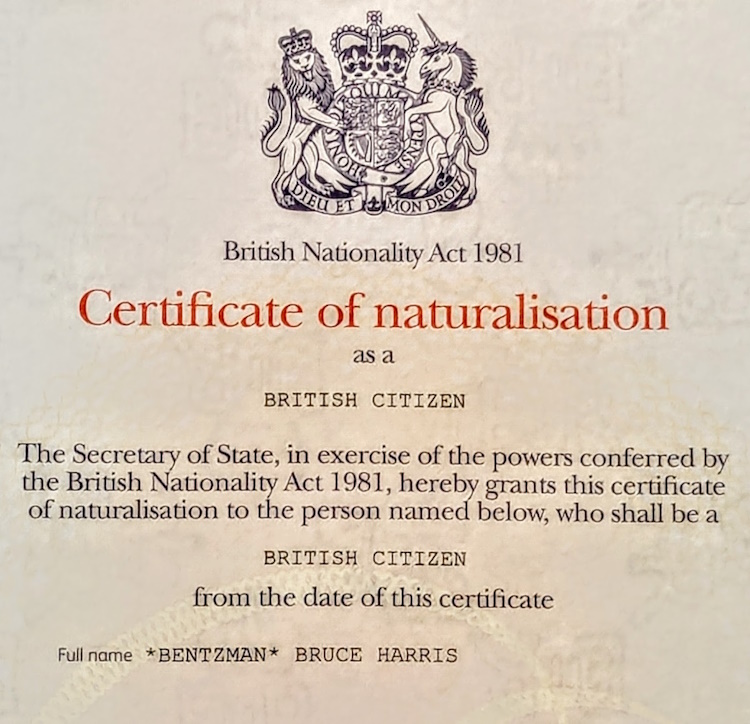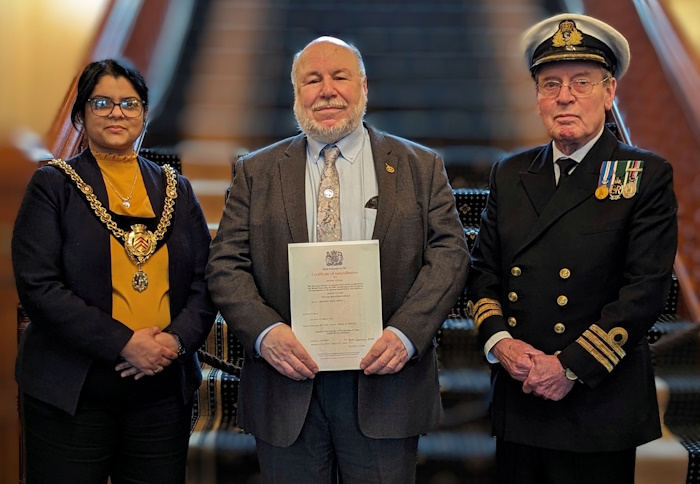 |
It was the Sunday before the ceremony, a rare afternoon of sunlight in Cardiff’s winter. I strolled through Bute Park with a sheet of paper printed with the Affirmation for British citizenship; “I Bruce Harris Bentzman do solemnly, sincerely and truly declare and affirm that on becoming a British Citizen, I will be faithful and bear true allegiance to His Majesty King Charles III, his Heirs and Successors, according to law.” I repeated it over and over, attempting to memorize it.
There was no need to memorize it. At the ceremony it would be read in short sections for me and others to repeat aloud. I knew this. Still, I wanted to memorize it and I wanted to ponder it. I wanted to be sincere when I recited the words that Tuesday.
The Affirmation was allowing me to declare allegiance on my honor and without having to call upon a “god” to witness my oath. It was an acknowledgement of genuine commitment and not mouthing a ritual formula that held no meaning for me. It would have meaning for me.
But the King? Judaism teaches to not bow to anyone but God. I’m ethnically a Jew, but I have abandoned the religion. As an American, we are instructed, since 1776, to not bow to a king. I was not abandoning my American citizenship. I was to have dual citizenship. I’m not sure how I would handle the situation should it arise, but I was confident the King would not be at this ceremony. Could I bear faithful allegiance to this man and his heirs? Among my Welsh friends are plenty of anti-royalists. My perception of this British King was that he stood as a symbol and embodiment of a culture. I could declare allegiance to acknowledge the continuity of this culture and wish to preserve the best parts of it. And this loyalty was constrained by the phrase “according to law”. I did not see this King as powerful as former kings. Having given my loyalty to the Statue of Liberty, I could certainly see no restraint in giving my loyalty to the more animated King Charles III. It is all symbols.
The stroll brought me to Blackweir Bridge, a footbridge across the River Taff. Upon reaching the bridge in the grey twilight, I walked out to the center. Facing down river towards City Centre, the sheet of water racing across the weir became troubled and crashed in white foam. From memory, I successfully recited the Affirmation. Then I turned to face a dark and still River Taff arriving from its source, and recited the Affirmation again, word perfect. I continued across the bridge and returned home along the opposite bank.
During the return route, I tried putting the Pledge to memory. In addition to the Affirmation, I would also have to pledge, “I will give my loyalty to the United Kingdom and respect its rights and freedoms. I will uphold its democratic values. I will observe its laws faithfully and fulfil my duties and obligations as a British citizen.” Absolutely I would, and unlike the American Pledge of Allegiance (to a flag), I didn’t have to annul my sincerity by reciting, “one nation under God”, a god in which I did not believe.
By the time I was passing Sophia Gardens, I discovered that although I could recite the Pledge from memory, I could no longer recite the Affirmation error free. How do actors do it?
“Why do you want to become a citizen?” a friend asked. “So many reasons,” I explained. I went on to tell her how I wanted to be able to contribute to my new home; I wanted to give back to a nation that has been kind in adopting me and making me feel comfortable. I wanted to do something good for it in return, like vote the Tories out of office.
I also told friends that I wanted to become a citizen to have that association with Ms Keogh, my cherished companion of 35 years. Native born (Cambridge), Ms Keogh was interred at Cardiff and The Vale Natural Burial Meadow. The plot next to her is reserved for me. The two of us placed abreast in Welsh ground with no marker? It is a pointless gesture that can only have meaning to me while I am alive. I want to disappear alongside her, leaving behind a fading echo of written words.
Tuesday arrived. I had not slept the night before.
I was allowed only two guests. They were Glenys and Steve. We all met at the Mansion House on Richmond Road. Built as a private home in 1896, it later served for many years as the home of the Lord Mayors of Cardiff. Now it is managed by the Cardiff Council for such ceremonies as me becoming a citizen.
Throughout the interior, symbols communicated history. Rich in paintings, displayed documents, and objets d’art, it was easy to occupy oneself while each pending new citizen was called into another room for a brief interview.
We dress in symbols. I wore an Aquascutum grey suit and Joseph Cheaney Brogue Boots. I wore Alan Berenbaum’s tie, a very dear friend who died suddenly and too soon, and one of Ms Keogh’s earrings hung from the buttonhole of my lapel, such thoughts and feelings in symbols that probably only I could read.

We were brought to a room where all those taking the Oath sat on one side, and we who were reciting the Affirmation had the other. We were presented with the Lord Mayor of Cardiff Bablin Molik. She wore the “Civic regalia”, a massive gold chain with a large pendant. There was also the Deputy Lord Lieutenant Commander Peter Machin of Danescourt, who would lead the recital as representative of the King. We were each called in turn to come forward and accept our “Certificate of naturalization” from the Deputy Lord Lieutenant, who wore a uniform that made me think of the comic operas of Gilbert & Sullivan. The Deputy Lord Lieutenant, who maintained a stiff upper lip and spoke to no one, startled me by smiling and remarking that I was born in New York City. Indeed, I was, but I love Cardiff more. “You were the only one he spoke to,” Steve later remarked.
At the foot of the main staircase, I posed between Lord Mayor and Deputy Lord Lieutenant for a photograph that Steve took with my phone. We then retreated back into the heart of the city to Glenys’s cozy flat for Champagne. She presented me with an immaculately wrapped gift, a book, of course; How to be a Brit by George Mikes. The three of us continued the celebration with lunch at Le Monde. And I confessed, “I just wanted to be Welsh, but it was a package deal.”
![]()
Mr Bentzman will continue to report here regularly about
the events and concerns of his life. If you've any
comments or suggestions, he would be pleased to hear from you.
You can find his
several books at www.Bentzman.com.
Enshrined
Inside Me, his second collection of
essays, is now available to purchase.
